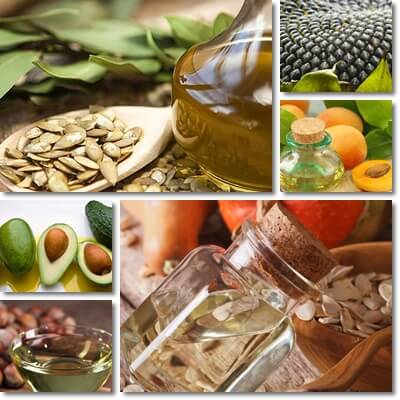Carrier oils are the oils you can eat or use safely on your skin without dilution, or both. Carrier oils are synonymous with edible oils, although some are consumed in small amounts only, as nutritional supplements, or for their various therapeutic effects, and a few require extra processing to render them 100% safe to eat and use. While most carrier oils are liquid, some are solid fats, such as cocoa butter and coconut oil.
Most of the benefits of carrier oils stem from their extremely high content of essential fatty acids, both unsaturated and saturated, and content of fat-soluble vitamins such as vitamins A, E and K.
What are carrier oils?
Carrier oils are typically edible oils. They are also called vegetal or vegetable oils because they are mostly made from plants, although there are plenty of edible oils made from animal fat too. Carrier oils are typically safe to eat and use topically, and do not pose toxicity risks short or long-term, so long as they are properly extracted and used.
They are also commonly used to dilute essential oils for use on skin, hence their name, ‘carrier’. As they are 100% fat, and essential oils dissolve in fat, carrier oils help carry the essential oils into the skin before they evaporate. They are also called base oils because they serve as a base for diluting carrier oils and as a base for infused oils (infused oils are edible vegetal oils infused with herbs such as thyme or rosemary, spices such as star anise, fruits such as chili peppers, flowers such as lavender or calendula).

What are some carrier oils?
- List of carrier oils made from plants:
- oils made from seeds: sunflower seed, apricot, grape seed, canola, jojoba, sesame seed, pumpkin seed, coconut, castor, marula, evening primrose, safflower seed, flax seed, poppy seed, castor oil, argan oil etc.
- oils made from fruits: avocado oil, palm oil, olive oil.
- oils made from nuts: cashew, walnut, hazelnut, pecan, macadamia, pistachio, sweet almond, palm seed/kernel oil and coconut oil and cocoa butter.
- oils made from legumes: peanut oil, soybean oil.
- oils made from grains: rice bran, wheat germ, corn oil (maize oil).
There are also carrier oils made from animal fat, such as emu oil (made from the fat tissue of emu birds), but also fish and seafood oils such as cod oil, herring, mackerel, salmon, tuna, anchovies, halibut and other fish oils, krill oil and even shark liver oil. Lard is the solidified, but edible fat extracted from the fat tissues of various farm animals. Lard and other solid animal fats are not considered actual oils as the idea of oil is associated with fat in a liquid state at room temperature. Only because they are higher in saturated fat than unsaturated that they are solid at room temperature. But even so, lard and other animal fats can sometimes be considered edible ‘oils’ (in a broader sense).
Are carrier oils edible?
There are actually different types of carrier oils. Most carrier oils are edible vegetal or vegetable oils, or animal fat, which means you can eat them in normal food amounts without risks (e.g. olive oil, sunflower seed oil, walnut oil, avocado oil). Some carrier oils, although technically also edible, are only meant to be consumed in limited amounts, either as nutritional supplements (e.g. fish oils, evening primrose oil) or for their various therapeutic properties (e.g. castor oil used as a laxative).
Consumption past a certain amount opens up the possibility of experiencing side effects and toxicity due to the build up of various compounds (e.g. vitamin A from fish oils).
At the same time, not all carrier oils are 100% safe to eat. Several oils require extra processing after extraction to render them safe to eat (e.g. lampante virgin olive oil). Such types of carrier oils have to be labeled ‘food-grade’ which indicates they are safe to use as food (e.g. food-grade borage oil, food-grade apricot kernel oil, food-grade peach kernel oil).

Carrier oils uses
- Cooking. You can cook with olive, avocado, sunflower seed, sesame seed, soybean, corn or maize, grape seed, palm, peanut and all nut oils. The type of cooking they are good for depends on their smoking point. Some oils such as coconut and cocoa butter are not suitable for heat-cooking and are thus best used at room temperature or cold, to make raw sweets or raw vegan desserts for example. Most refined oils, such as refined sunflower oil or refined avocado oil, are suitable for high-heat cooking such as deep- frying, stir-frying or searing, but also unrefined, extravirgin avocado oil. Others such as extravirgin olive oil can be used for light cooking only. Find out what are the 7 types of olive oil by quality.
- Infusing oils. Most oils you like to cook with or eat regularly are great for infusing. For example, you can add thyme, rosemary, sage, mint, bay leaves or other herbs to your extravirgin olive oil. Or fruits like hot chili peppers, lemon slices, lemon rind, dried cherry tomatoes. Or flowers like lavender, dandelion, St John’s wort, calendula, saffron. Or spices such as garlic cloves, garlic scapes, ginger root, turmeric root, star anise. Oils with little flavor, such as refined sunflower oil, are some of the best candidates for infused oils.
- Diluting oils. Any edible carrier oil you use regularly and like is great to use to dilute your essential oils for topical use. Of course, you may prefer an oil with a particular viscosity (either thinner or thicker), a certain odor or an organically-sourced, cold-pressed, unrefined oil that is more natural over a refined oil that is not organically certified. For example, extravirgin olive oil is thicker, so it lingers on the skin longer and feels more pleasant. It’s also cold-pressed and high-quality, rich in vitamins E and K which have anti-inflammatory, emollient, antioxidant and anti-aging properties. Extravirgin avocado oil is absorbed into the skin fast and is also a rich source of vitamin E which helps moisturize the skin, while exerting anti-aging benefits, and pro-vitamin A carotenoids with antioxidant benefits.
- Cosmetic oils. Carrier oils high in linoleic acid may help break up microcomedones and open pores, preventing acne breakouts in some instances, according to some studies. Rose hip seed oil, for example, is higher in alpha-linoleic acid, hence its widespread cosmetic use for acne treatment. Other cosmetic oils include cocoa butter, coconut oil, argan oil for skin and hair care, evening primrose, apricot kernel, olive oil and more.
- Soap oils. You can make soap from lard, olive oil, coconut oil, palm oil, peanut oil and other seed oils.
- Nutritional supplements and other therapeutic uses. Fish oils such as cod liver oil or mackerel are used as nutritional supplements for vitamin A deficiency and vitamin A deficiency. Most fish and other seafood oils are an important source of DHA Omega-3 fatty acids, nutrients essential for proper brain development, and used as brain-food/supplements. Red palm oil is a source of carotenoids with benefits for eye health. Castor oil is used as a laxative.
- Other uses: food additive (coconut oil, palm kernel oil), cosmetics (cocoa butter, jojoba, castor, evening primrose oil), use in woodwork (walnut oil is used as wood finish), paint (safflower, poppy seed, corn oil), bio-fuel (pecan oil), biodiesel (peanut, corn, canola oil), lamp fuel (lampante olive oil), medicines (cocoa butter, castor, corn, jojoba oil) etc.
What are the benefits?
- Most vegetable cooking oils are excellent sources of monounsaturated and polyunsaturated fatty acids such as Omega-3, Omega-6, Omega-9 fatty acids which are good for the heart, skin and brain.
- A lot of green-tinged oils from vegetal sources are rich in vitamins E and K (e.g. olive oil, avocado oil).
- Fish oil is rich in vitamins A and D which promote eye health and support the immune system and bone health.
- Both the unsaturated fatty acids and vitamins in carrier oils have antioxidant benefits.
- Animal fats are generally higher in saturated fats. While unhealthy in excess, saturated fats nourish and moisturize skin as well as provide antioxidant protection.
- Carrier oils are nourishing for the skin, moisturizing and protecting against dryness.
- As they are 100% fat and edible, they promote the absorption of fat-soluble vitamins (A, D, E, K).
- All edible oils have mild laxative properties, helping relieve constipation (getting some fat in your diet helps). Some oils have quite strong laxative properties (e.g. castor oil).
- Other cosmetic benefits: carrier oils have anti-acne properties (e.g. rosehip seed oil), antioxidant and anti-aging benefits (e.g. most unrefined, cold-pressed carrier oils), hydrating, softening and skin soothing effects, reduce dryness, balance sebum production and promote skin regeneration, restore shine to hair and nourish dry, brittle, damaged hair.
What are the side effects?
As opposed to essential oils, carrier oils are non-toxic and do not or should not pose any health risks both short or long-term, provided they are unadulterated, properly extracted and certified for consumption (food-grade) or other uses. Even so, there may be side effects to carrier oils such as:
- Allergic reactions. Sesame seed, soybean, peanut and nut oils in general such as walnut, pecan, macadamia, cashew or hazelnut oil and even avocado can potentially cause allergic reactions.
- Loose stools, diarrhea. Taking castor oil, which is a known laxative, can cause loose stools and diarrhea. That’s actually one of its main uses.
- Hypervitaminosis A. Taking too much fish oil can cause too much vitamin A to accumulate in the liver which causes toxic effects.
- Increased risk of bleeding. Taking evening primrose oil or borage oil is associated with an increased risk of bruising and bleeding. The two oils are best avoided before surgery.
- Medicine interactions. Carrier oils such as evening primrose and borage can interact with anticoagulant medication, potentiating their effects and causing an increased risk of bleeding. Green vegetable oils such as extravirgin olive oil are high in vitamin K and can promote blood clotting over time, if eaten in excessive amounts.
- Hepatotoxic effects. Borage oil naturally contains a compound called amabiline which is toxic for the liver. Make sure your borage oil is certified to be free of the toxin and labeled food-grade, but also avoid taking too much of it.
- Seizures. Evening primrose oil may cause/trigger seizures in predisposed individuals.
- Cardiovascular side effects. Excessive intake of edible oils can lead to weight gain and cardiovascular problems such as atherosclerosis or cardiovascular events over time.
Carrier oils for essential oils
What are the best carrier oils for diluting essential oils? There’s really no such thing as the best carrier oil for essential oils since people tend to respond differently to various foods and skin care products. Some people are allergic to certain plants or compounds in them, others dislike certain smells and so on. Overall, the best carrier oils for essential oils are the ones you use on a regular basis and respond well to, as well as like.
Vegetable oils you use all the time, preferably ones that are cold-pressed/only minimally processed, are the safest and healthiest choice for diluting your essential oils. Not only are they non-toxic and safe to eat, but they’re also less likely or the least likely to cause side effects such as irritation, allergic reactions or other problems.
